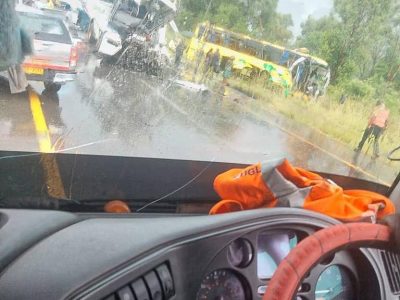A significant figure in Zimbabwe make a living selling goods on the street. Due to restrictions aimed at curbing coronavirus infections, their income is shrinking drastically.
Unlike what other countries are currently doing to assist the vending community in the wake of COVID-19 pandemic, Zimbabwe is not providing for it’s struggling citizens.
A survey carried out in the capital city, Harare, by TechMag TV proved a dire situation among vendors.
Putting on a brave face, she displays her tomatoes and vegetables on an open pavement right at the centre of the city.
She doesn’t want to be interviewed as she fears the local police.
Her trading place is at the corner of Robert Mugabe and fourth street.
Finally, we convinced her to share her vending experiences under the COVID-19 induced lockdown.
Her name is Paida.
“I have to be alert of Harare City Council police officers , they can just appear and if I’m caught selling, they will confiscate my things and charge me with a fine,” Paida said as she uncomfortably narrates her story.
“ Yes there’s COVID-19, but I have got a family to feed everyday. I survive on vending, that’s my only source of income. It’s not by choice that I am here but economic challenges brought me here.”
” I have to face both wars, COVID-19 and Hunger. If I stay at home due to COVID-19, my family may survive the pandemic but hunger will strike them. So what do we do? You see our survival potions are limited.”
Paida is not the only informal trader currently enduring the adverse effects of coronavirus.
Vendors Initiative for social economic transformation ( VISET) in June noted that informal traders have been severely affected by the current lockdown.
“Vendors Initiative for Social and Economic Transformation (VISET) notes with weighty concern the directive by President E.D. Mnangagwa with regards to conditions precedent for the re-opening of the informalnformal economy, where entities and individuals are required to register before they can resume trading.”
“It is VISET’s view that, under the prevailing circumstances, this condition is totally impractical and likely to result in rent-seeking behaviour from unscrupulous officials and space barons. No details were furnished as to who exactly would be the issuing authority nor what conditions one would need to satisfy. Furthermore, most informal traders’ markets were destroyed and the majority are yet to be completed, so one wonders where they will trade from,” said
VISET then after President Emmerson Mnangagwa announced that vendors need to formally register their businesses to resume operation.
Another banana vendor who operates by Chinhoyi street shared the same grievances raised by Paida.
“Municipality police are the biggest threat to my business, without their frequent raids I can afford daily basics to feed my family,” he said.
“I know COVID-19 is there and I totally respect lockdown restrictions but what about my means of survival? I cannot afford a day sitting at home. I have been in this business (Selling bananas) for 4 years now. If I don’t do that my family will starve, so its better I come here battle with the police but at the end of the day I take something home.”
Following daily spikes in COVID-19 cases, the president on Tuesday announced new restrictive measures to curb the spread of the virus.
Among other measures only formal workers are allowed in town, curfew from 6 pm to 6 am, religious and social gatherings banned with funerals curtailed.
The country has to date recorded note than 2000 cases including 26 deaths.










Comments